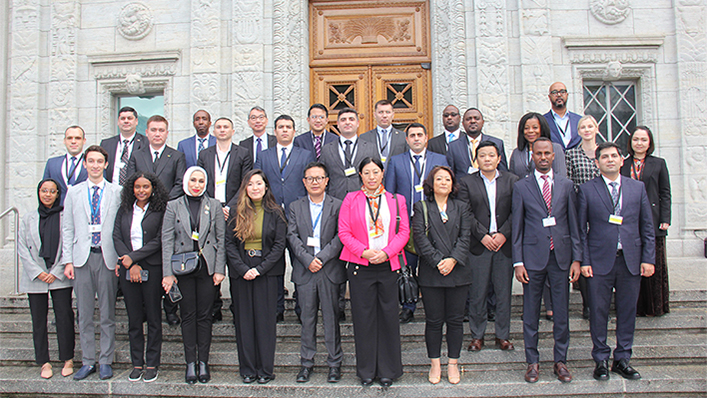
The governments represented were Azerbaijan, Bahamas, Belarus, Bhutan, Iraq, Libya, Somalia, Turkmenistan and Uzbekistan. Participants were given guidance on how to prepare initial goods offers, consolidate bilateral market access agreements and verify schedules of concessions and commitments on goods.
Speaking at the opening session, the Director of the WTO Accessions Division Maika Oshikawa emphasised the importance of the training programme in strengthening acceding governments’ negotiation capacities. “Managing market access negotiations on goods alone can be a challenging task, even for the biggest economies with capacities,” she told participants. “This training is designed not only to equip you to start negotiations but, more importantly, to successfully conclude them.”
The curriculum included lectures and interactive exercises organized by WTO experts. A roundtable took place with representatives of selected WTO members active in accessions and another with negotiators from recently acceded governments. The objective was to gain insights on market access negotiations with specific WTO members, known as “bilateral negotiations”. Participants also simulated the negotiation of bilateral market access agreements on goods.
Participating in the course was Bokhodirjon Bobokulov, Chief Inspector at Uzbekistan’s State Customs Committee, who said: “I gained practical knowledge on negotiating market access, analysing non-tariff barriers and aligning trade policies with WTO principles. This training has equipped me with essential tools to engage more effectively in international trade discussions.”
Another course participant, Sharmarke Abdi Jama, Senior Trade Advisor in the Office of the President of Somalia, underlined the importance of preparation and strategy in market access negotiations: “The course significantly enhanced my understanding of tariff schedules and taught me how to find a balance when it comes to stakeholders’ interests in the negotiations, while also aligning with global trade rules. The combination of theoretical insights and practical exercises will be particularly beneficial to my work.”
Also taking part in the course was Diveen Abduraheem, Head of the Trade in Goods Division at Iraq’s Ministry of Trade. Underscoring the comprehensive nature of the training programme, she stressed: “Through this course, I improved my understanding of WTO rules and trade agreements. It enhanced my negotiation skills and taught me how to analyse trade data effectively. Overall, the course has prepared me for real-world trade negotiations.”
A training course on navigating WTO rules in accession negotiations took place in December 2023.
Share
Reach us to explore global export and import deals